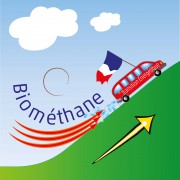The BIOVALSAN project – good prospects for biomethane in France
 Only a few weeks before the COP21 in Paris is going to start, the French minister Ségolène Royal has inaugurated an European showcase for innovative circular flow economy: The BIOVALSAN project, the first wastewater treatment plant, utilizing wastewater of a metropolis to produce biomethane.
Only a few weeks before the COP21 in Paris is going to start, the French minister Ségolène Royal has inaugurated an European showcase for innovative circular flow economy: The BIOVALSAN project, the first wastewater treatment plant, utilizing wastewater of a metropolis to produce biomethane.
„With a treatment capacity of 1,000,000 inhabitant equivalents, the Wantzenau Wastewater Treatment Plant (WWTP) is the fourth largest WWTP in France. The volume of biogas produced by this facility’s digesters represents a potential energy generation capacity of 16 GWh/year, which is equivalent to the annual needs of 5,000 low-energy consumption homes. Biovalsan’s purpose is to utilise this resource for the Strasbourg community’s benefit, based on a short, local processing model. “ (source: http://biovalsan.eu/)
With regard to the actual development in French energy transition, the minister explained how the promotion of biogas will continue.
The new feed-in tariffs for electricity produced by existing plants will be published in a few days. Biomethan will also get further promotion, as the co-use of BioGNV will become an obligation. If the new tariffs will not lead to reach the goals for rising the biogas production, tenders will be published.
The wish, that with the inauguration of Biovalsan a series of innovative projects will start, is not in vain. There are more French projects proceeding from preliminary studies to planning phase.
Marie-Luise Schaller
